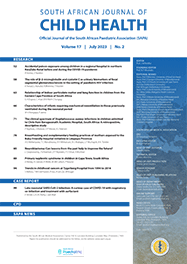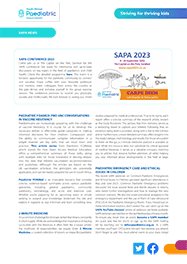Articles

Using community-based interventions to improve disease prevention practices of caregivers of under-5s in Ile-Ife, southwestern Nigeria
Abstract
Design. A cross-sectional design.
Setting. Osun State, Nigeria, between August and September 2007.
Subjects. Mothers or caregivers of children 0 - 59 months of age and their index children.
Results. The IMCI key disease prevention practices were generally better applied in the C-IMCI-compliant LGA than in the non-compliant LGA.
Significant differences were observed in the proportion of caregivers who would wash their hands with soap after using the toilet (p=0.0445), after attending to a child who has passed stool (p=0.000), before feeding a child (p=0.000), before preparing food (p=0.000), and before eating (p=0.0385).
More caregivers from the compliant than the non-compliant LGA had ever used a method to prevent malaria. More than a quarter of caregivers from the non-compliant LGA did not use any method to prevent malaria.
More caregivers from the non-compliant LGA showed deficiencies in their knowledge base of HIV/AIDS infection. Knowledge was particularly poor with respect to mother-to-child transmission of HIV. Only 39% of caregivers from the non-compliant LGA believed that a child can be infected with HIV/AIDS.
Author's affiliations
O M Ebuehi, DR
Full Text
Keywords
Cite this article
Article History
Date published: 2010-06-28
Article Views
Full text views: 2425

.jpg)



Comments on this article
*Read our policy for posting comments here